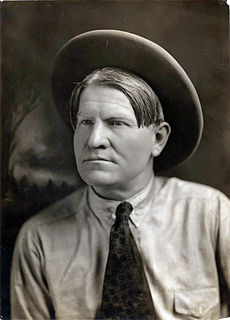
Charles Marion Russell, also known as C. M. Russell, Charlie Russell, and "Kid" Russell, was an American artist of the American Old West. He created more than 2,000 paintings of cowboys, Native Americans, and landscapes set in the western United States and in Alberta, Canada, in addition to bronze sculptures. He is known as "the cowboy artist" and was also a storyteller and author. He became an advocate for Native Americans in the west, supporting the bid by landless Chippewa to have a reservation established for them in Montana. In 1916, Congress passed legislation to create the Rocky Boy Reservation.
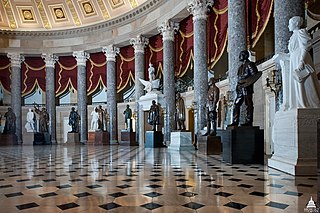
The National Statuary Hall is a chamber in the United States Capitol devoted to sculptures of prominent Americans. The hall, also known as the Old Hall of the House, is a large, two-story, semicircular room with a second story gallery along the curved perimeter. It is located immediately south of the Rotunda. The meeting place of the U.S. House of Representatives for nearly 50 years (1807–1857), after a few years of disuse in 1864 it was repurposed as a statuary hall; this is when the National Statuary Hall Collection was established. By 1933 the collection had outgrown this single room, and a number of statues are placed elsewhere within the Capitol.

The National Statuary Hall Collection in the United States Capitol is composed of statues donated by individual states to honor persons notable in their history. Limited to two statues per state, the collection was originally set up in the old Hall of the House of Representatives, which was then renamed National Statuary Hall. The expanding collection has since been spread throughout the Capitol and its Visitor's Center.

John Barney Weaver was a sculptor from Anaconda, Montana. He was known for creating a statue of Charles Marion Russell at the National Statuary Hall Collection, and three busts of Chester W. Nimitz for the United States Navy.
Charles Brantley Aycock is a bronze sculpture depicting the American politician of the same name by Charles Keck, installed in the United States Capitol's crypt as part of the National Statuary Hall Collection. The statue was gifted by the U.S. state of North Carolina in 1932.
Barry Goldwater is a bronze sculpture depicting American politician and businessman of the same name by Deborah Copenhaver Fellows, installed at the United States Capitol's National Statuary Hall, in Washington, D.C., as part of the National Statuary Hall Collection. The statue was donated by the U.S. state of Arizona in 2015, and replaced a statue of John Campbell Greenway, which the state of Arizona gifted to the collection in 1930.
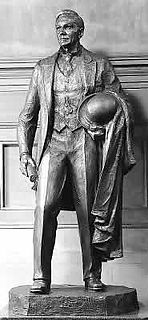
John Burke is a bronze sculpture depicting the American politician of the same name by Avard Fairbanks, installed at the United States Capitol's National Statuary Hall, in Washington, D.C., as part of the National Statuary Hall Collection. The statue was gifted by the U.S. state of North Dakota in 1963.

John C. Calhoun is a marble sculpture depicting the American statesman of the same name by Frederick Ruckstull, installed in the United States Capitol's crypt, in Washington, D.C., as part of the National Statuary Hall Collection. The statue was gifted by the U.S. state of South Carolina in 1910.
Jeannette Rankin is a bronze sculpture depicting the American politician and women's rights advocate of the same name by Terry Mimnaugh, installed in the United States Capitol Visitor Center's Emancipation Hall, in Washington, D.C., as part of the National Statuary Hall Collection. The statue was gifted by the U.S. state of Montana in 1985.

The National Statuary Hall Collection holds statues donated by each of the United States, portraying notable persons in the histories of the respective states. Displayed in the National Statuary Hall and other parts of the United States Capitol in Washington, D.C., the collection includes two statues from each state, except for Virginia which currently has one, making a total of 99.
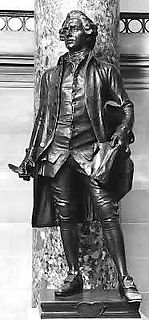
Charles Carroll is a bronze sculpture depicting Charles Carroll of Carrollton by Richard E. Brooks, installed in the United States Capitol's crypt, in Washington, D.C., as part of the National Statuary Hall Collection. The statue was gifted by the U.S. state of Maryland in 1903.
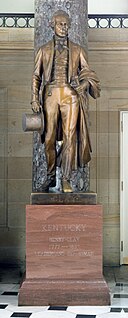
Henry Clay is a 1929 bronze sculpture by Charles Henry Niehaus depicting the lawyer and politician Henry Clay, installed in the United States Capitol in Washington D.C. as part of the National Statuary Hall Collection. It is one of two statues donated by the state of Kentucky. The statue was accepted into the collection by Virgil Chapman on March 3, 1929.

Hannibal Hamlin is a bronze sculpture depicting the American attorney and politician of the same name by Charles Tefft, installed at the United States Capitol's National Statuary Hall, in Washington, D.C., as part of the National Statuary Hall Collection. The statue was gifted by the U.S. state of Maine in 1935.

Andrew Jackson is a 1928 bronze sculpture of Andrew Jackson by Belle Kinney Scholz and Leopold Scholz, installed in the United States Capitol, in Washington D.C., as part of the National Statuary Hall Collection. It is one of two statues donated by the state of Tennessee. The statue was accepted into the collection by Senator Kenneth McKellar on April 16, 1928.

John James Ingalls is a 1905 marble sculpture of the politician of the same name by Charles Henry Niehaus, installed in the United States Capitol, in Washington D.C., as part of the National Statuary Hall Collection. It is one of two statues donated by the state of Kansas. The statue was accepted in the collection by Senator Arthur P. Gorman on January 21, 1905.

Ephraim McDowell is a bronze sculpture depicting the American physician and surgeon of the same name by Charles Henry Niehaus, installed in the United States Capitol Visitor Center, in Washington, D.C., as part of the National Statuary Hall Collection. The statue was gifted by the U.S. state of Kentucky in 1929.
Francis Harrison Pierpont is a 1910 marble sculpture of Francis Harrison Pierpont by Franklin Simmons installed in the United States Capitol, in Washington, D.C., as part of the National Statuary Hall Collection. It is one of two statues donated by the state of West Virginia. The sculpture was unveiled by the Hon. Thomas Condit Miller, on April 27, 1937.

John Campbell Greenway is a 1930 bronze statue of John Campbell Greenway by Gutzon Borglum, one version of which was installed in the United States Capitol, in Washington D.C., as part of the National Statuary Hall Collection. It was one of two statues donated by the state of Arizona. The sculpture was unveiled by Senator Henry Ashurst of Arizona on May 24, 1930.
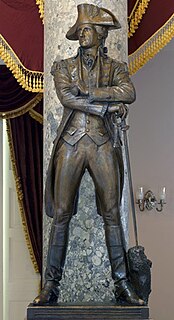
John Sevier is a bronze sculpture depicting the American politician of the same name by Belle Kinney and Leopold Scholz, installed in the United States Capitol's National Statuary Hall, in Washington, D.C., as part of the National Statuary Hall Collection. The statue was gifted by the U.S. state of Tennessee in 1931.

John Stark is a marble sculpture depicting John Stark by Carl Conrads, installed in the United States Capitol's crypt, in Washington, D.C., as part of the National Statuary Hall Collection. The statue was donated by the U.S. state of New Hampshire in 1894.
















